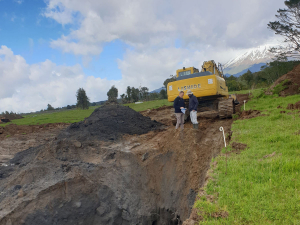That’s the message from Taranaki Regional Council director – resource management Fred McLay after a farmer was fined $95,750 in New Plymouth District Court this week.
Colin David Boyd admitted to carrying out illegal earthworks on his Surrey Rd, Inglewood farm.
The fine is comprised of a $78,750 for three charges of discharge of sediment and reclamation, as well as $17,000 for not complying with an abatement notice plus an enforcement order issued.
It is the third times Boyd has been convicted of offences under the Resource Management Act 1991 (RMA).
Between October and November 2019, he carried out significant earthworks in and around a tributary of the Mangatengehu Stream.
He constructed a diversion channel, reclaiming a 278m section of the stream. The majority of the riparian vegetation had been removed and around 160m of the stream had been drained. Significant scour and erosion occurred, with silt and sediment flowing into the stream and impacting water supplies.
There was a noticeable impact on the stream’s freshwater biology, with significant decline in nearby species diversity and population.
McLay says the fine reflects the severity of the offending.
“It reiterates this kind of illegal activity will not be tolerated by the Council or the courts and those who let the side down will be held accountable.
“It is worth noting that a breach of this magnitude is an exception and doesn’t reflect the generally high level of compliance among Taranaki farmers.”
However, with implementation of the Government’s Essential Freshwater regulations under way and the RMA set for reform, McLay says it’s a timely reminder for anyone planning work on their farms.
“We understand it’s a challenging time as farmers get their heads around the changing requirements. The Council is working closely with the rural community to get them the information they need and ensure we’re all on the same page.
“In the meantime the message is simple – if in doubt, check. If you’re not sure what you can and can’t do, please get in touch with the Council. We’d much rather help you get it right, than have to take enforcement action later.”



















